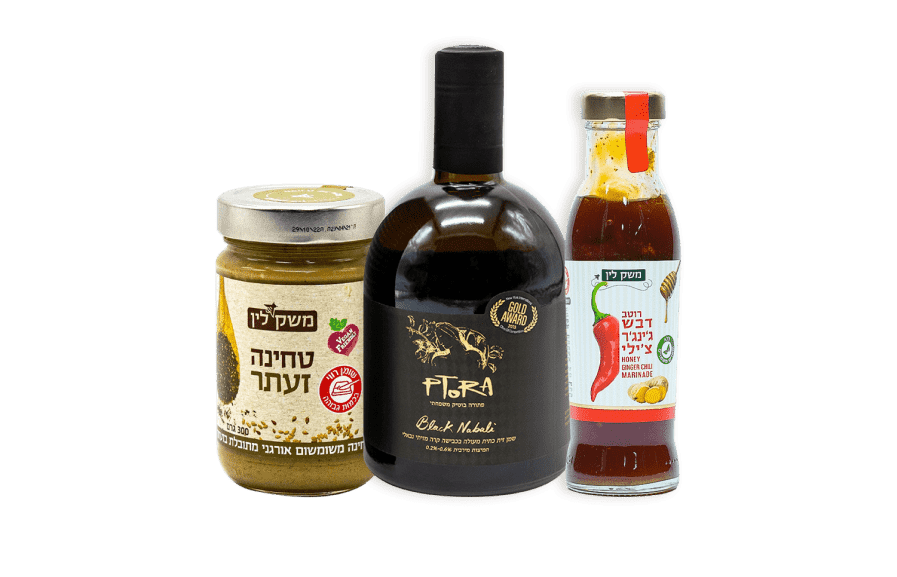Once a year, after the end of the rainy season, the Land of Israel springs back to life as the first trees bloom and the fruits begin to emerge!
“A land of wheat, and barley, and vines, and fig trees and pomegranates; a land of olive oil and honey (Deut. 8:8).
Tu Bishvat is one of the most joyful festivals in the Jewish calendar, especially for those living in the Holy Land! On this day we celebrate the blooming of the trees in the land, a sign that the first fruits are beginning to grow!
To celebrate, we hold a 'Seder', in which we lay out a whole variety of fruits and vegetables and recite blessings over them with our family and friends. At the center are the seven species native to the Holy Land!
At the core of Tu Bishvat are the themes of agriculture and renewal. So you will see many Israelis heading into the nature to admire the beautiful trees in bloom and attend tree-planting ceremonies to strengthen their connection to the Land of Israel!
Tu Bishvat is one of the most joyful festivals in the Jewish calendar, especially for those living in the Holy Land! On this day we celebrate the blooming of the trees in the land, a sign that the first fruits are beginning to grow!
To celebrate, we hold a 'Seder', in which we lay out a whole variety of fruits and vegetables and recite blessings over them with our family and friends. At the center are the seven species native to the Holy Land!
At the core of Tu Bishvat are the themes of agriculture and renewal. So you will see many Israelis heading into the nature to admire the beautiful trees in bloom and attend tree-planting ceremonies to strengthen their connection to the Land of Israel!

Tu Bishvat is an important date in Israel's agricultural calendar. Knowing when the agricultural year begins enabled the farmers to correctly observe the sabbatical laws of the land!
Like everything in Israel, there are rules and laws to follow! In agriculture, we observe the laws of Shmitta. We follow an agricultural cycle of seven years, the last of which is called the Shmitta year (sabbatical) in which are instructed to leave our fields and let the land rest, unworked, for the entire year. During Temple times, in the first, second, fourth, and fifth years of the cycle, farmers were required to set aside a tenth of their produce and bring it to eat in Jerusalem.
These portions were referred to as Masser (tithes), some were given to the Priests, others to the Levities. In the third and sixth years, the owners would be required to give their tithes to the poor, who could eat them wherever they wanted. In the final year of the cycle, the Shmitta year, the field is considered ownerless and everybody is welcome to come and benefit from the produce.
But without knowing exactly what day the agricultural year began, it would be impossible to accurately observe the laws of Shmitta in the Holy Land! The Rabbis ruled that the 15th of the Hebrew month of Shevat would be the cut-off point. So any fruit that blossomed before would be considered the produce of the previous year. Why this particular date? Because in the region in which the Land of Israel lies, it requires four months for enough rain to fall and properly saturate the soil and produce the fruits! Tu Bishvat marks the end of this period!
From tree planting to a fruity festive meal, we celebrate Tu Bishvat by connecting with the natural agricultural goodness of the Holy Land!
One of the main ways in which we celebrate Tu Bishvat is by hosting a Seder (a set order). It is somewhat similar to Passover in which we run through an order of special foods related to the festival and recite blessings over each one. On Tu Bishvat, some have a custom of filling their tables with as many fruits, nuts, and vegetables as they can, in order as recite as many blessings as possible and truly appreciate the wonderful produce of the Land of Israel! At a minimum, it is important to try and get at least the seven species native to Israel which are: Wheat, barley, grapes, figs, pomegranates, olives and dates.
With Tu Bishvat being the festival of the trees, it is only right to head outdoors to go and admire them! So you can expect to see thousands of Israelis in winter attire exploring the wonderful parks and nature reserves across Israel and attending the many tree-planting ceremonies to help make the desert bloom even more!

Want to celebrate Tu Bishvat with your family? With our activities, you can have some truly fruity, festive fun, just like we do in Israel!
Hold your very own Tu Bishvat Seder at home!
Try and get hold of the seven species, and eat them together with your family! Wheat (can be cookies, crackers, or cakes containing wheat), barley (beer or any other item containing barley), grapes (or wine or raisins), figs (dried works as well!), pomegranates (you can also get juice!), olives and dates. Most of the seven species are widely available in your local farmers market or fruit retailers. But don't stress if you can't find them all! Try and see how many food products you can name which contain each of the seven species!
And the prize for the most exotic fruit goes to...
Compete with your family and friends and see who can get hold of the most exotic fruit or vegetable. And then at the Tu Bishvat Seder, each person should take a turn to present what they found, where it originated from, and where they managed to buy it! Struggling to think where to find exotic fruit? Or what qualifies as an exotic fruit? Simply head over to an ethnic superstore and check out their fresh fruit and vegetable section! Gauvas, lycees, even Medjool dates or mangos from Israel are exotic!
Put all your fruits and vegetables to good use!
Tu Bishvat is a wonderful opportunity to come up with all kinds of creative dishes containing a whole variety of fruits and vegetables. From a squash soup for starters, a meat and dried fruit stew, and a fruit salad for dessert, you can cook up a healthy and hearty meal for Tu Bishvat. Head over to Lev Haolam's recipe section for some inspirational dishes that are perfect for your meal!

Head outside and explore the nature
Just like the people of Israel head outside to experience the beauty of the Land and the clean fresh air, so can you! Whether you live close to a nature reserve, a natural wonder or landmark, or a beautiful park, grab your jacket, scarf, and hat and go outside! Admire the trees, the lush green grass, and all the beautiful plantlife which does so much good for the earth. Tu Bishvat is the perfect time to connect with nature and all the goodness contained within! And just like we plant trees in Israel, so can you! Head online and see how you can get a tree planted in your name in honor of Tu Bishvat!
Build your own family tree!
Tu Bishvat is the perfect festival for discovering your roots! Get your children busy by creating a wonderful family tree and watch how it branches out as they add your different family members to the tree. Soon you'll have a huge tree, representing your wonderful family! For a real journey of discovery, you can access some of the online platforms in which you can find out information about your historical ancestry and heritage. You never know who you might be related to until you start looking!
After the darkness of the winter months, the festival of Tu Bishvat is our invitation to start heading outdoors and discover all the goodness that awaits us there. It is the perfect time to connect with nature and see what good we can do for the environment and local agriculture.
Let the Tu Bishvat Seder inspire you to discover and savor the wonderful fruits, nuts, and vegetables of the Holy Land through the seven species, and get creative in the kitchen as you discover new Israel-themed recipes to wow your family!
Tu Bishvat might be the new year for trees, but it can also be used as a time to renew your connections with family, friends and maybe even make a new one with the Holy Land!

Wherever you are in the world, with Lev Haolam you can create an everlasting bond with Israel and the people who live there!
We are proud to work with hundreds of talented artisans and small business owners who live in communities across the Biblical heartlands of Judea and Samaria, the Galilee, and the Golan Heights.
This enables us to share their wonderful products with subscribers who get to experience their very own personal tour across the Biblical heartlands of Israel in the comfort of their own homes!
Along with the accompanying magazine featuring exclusive interviews and profiles on the people behind the products, plus updates from Israel on our social channels and exclusive members-only content, you'll get to know Israel like never before! Each product is the pioneer's way of showing their deepest gratitude and appreciation to subscribers. The impact is tremendous as it enables them to provide for their families, keep offering meaningful employment opportunities, and contribute to the development of their communities. What this means, in essence, is that every subscriber is playing an active part in revitalizing the Biblical heartlands of Judea and Samaria!









